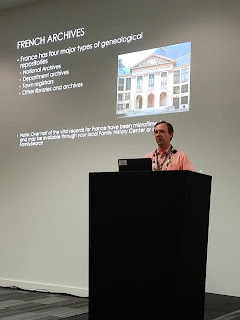The first class I attended was FamilySearch's Helpful Hidden Tools by Darris Williams. He discussed some of the things many of us might overlook while using FamilySearch. One of the things he talked about was the map of England Jurisdictions in 1851. This map shows county, parish, civil registration, diocese and many other boundaries of England at that time. This map can be found at https://www.familysearch.org/mapp. This is a great tool for those who are researching English ancestors. He also pointed out that there are many genealogies on FamilySearch including the IGI which can provide important hints. They are also beginning to add Affiliate Library pages to the FamilySearch Wiki. If you know of an affiliate library let them know that they can build their own page. Instructions can be found at https://www.familysearch.org/wiki/en/FamilySearch_Wiki:WikiProject_Creating_an_Affiliate_Library_Page. Did you know that there are now over 97,000 pages in the Wiki? Those pages are important resources that can help you discover how to research an area or topic. Then there is the Guided Research page which steps you through the process of your research. You go from page to page by selecting the appropriate response and at the end you should have a list of potential sites that will help you do the specific research. The Guided Research page begins at https://www.familysearch.org/wiki/en/Guided_Research_for_Online_Records. These are some great new tools that we should all try.
 |
| My wife and her 12th cousin, Donny Osmond |
The second presentation I attended was What is FamilySearch? by David Rencher. David provided some good information on the history of FamilySearch, from its beginnings as the Genealogical Society of Utah back in 1894 to the international presence of FamilySearch today. They started indexing in 1927, microfilming records in 1938, and opened the Granite Mountain Vault in 1963. In 1998, they began using digital cameras to record new records, with over 300 cameras in the field. In 2004 they began digitizing more than 2.4 million microfilm rolls and in 2007 they put the first digital collections online. The first version of FamilySearch was released online in 1999 and the current iteration was released in 2013. So what can we now find online at FamilySearch? They now have over 7.4 billion searchable names and over 3.1 billion images, along with over 423,000 digital books.
The third class that I attended was Use an Ancestor's FAN Club to Get Past Brick Walls by Drew Smith, one of the Genealogy Guys. He provided several examples of how expanding your research to the Family, Associates and Neighbors (FAN) can increase your chances for success in researching elusive ancestors.
 |
| My wife and I talking to Dan Debenham |
The final event of the night was a fireside with Elder Bednar and his wife talking about family history.
Overall, this was another successful RootsTech prepared by FamilySearch. I am looking forward to the 10th anniversary of RootsTech Salt Lake in 2020.



